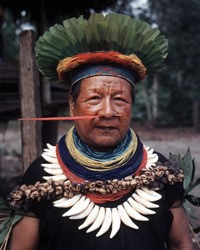Kofan in Colombia

Photo Source:
Anonymous
|
Send Joshua Project a map of this people group.
|
| People Name: | Kofan |
| Country: | Colombia |
| 10/40 Window: | No |
| Population: | 1,900 |
| World Population: | 3,400 |
| Primary Language: | Cofan |
| Primary Religion: | Ethnic Religions |
| Christian Adherents: | 8.00 % |
| Evangelicals: | 1.00 % |
| Scripture: | New Testament |
| Ministry Resources: | Yes |
| Jesus Film: | Yes |
| Audio Recordings: | Yes |
| People Cluster: | South American Indigenous |
| Affinity Bloc: | Latin-Caribbean Americans |
| Progress Level: |
|
Introduction / History
The Kofan people are also called Cofan. They live in Colombia and Ecuador.
They have consistently had troubles with outsiders trying to take their land. In the 1500s and 1600s they had violent confrontations with Spanish colonizers who were looking for gold and good farmland. The rubber boom of the late 1800s and early 1900s brought several deadly diseases to the Kofan people. From the 1940s-60s there were oil companies that drilled for oil and destroyed the natural environment in the Kofan homeland. Since the Kofan people depend on their environment for food, this was devastating. Eventually they managed to re-introduce some of the wild animals that they once hunted for food. Outsiders brought them turtles and chickens to replenish their food supply.
What Are Their Lives Like?
The Kofan people are now able to live independent, self-sustained lives. But that can change at any time.
SIL has friendly contact with them, so there is the promise of keeping their language alive. So far, they have a New Testament in their language.
What Are Their Beliefs?
Though there is a Roman Catholic presence among the Kofan people, they are mostly animistic, worshiping the same way as their ancestors.
What Are Their Needs?
Like all other peoples of the world, the Kofan need to put their hope and trust in Jesus Christ.
Prayer Points
Pray for Kofan people who love the Lord to disciple others in his ways.
Pray for these disciples to live holy lives that draw others to the Throne of Grace.
Pray for the Holy Spirit to move in Kofan families, leading them to understand their dignity and self-worth comes from their relationship with Jesus Christ.